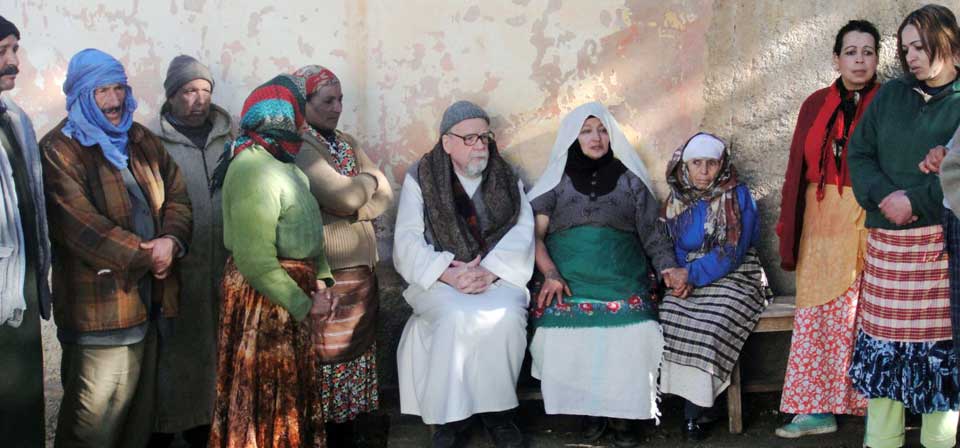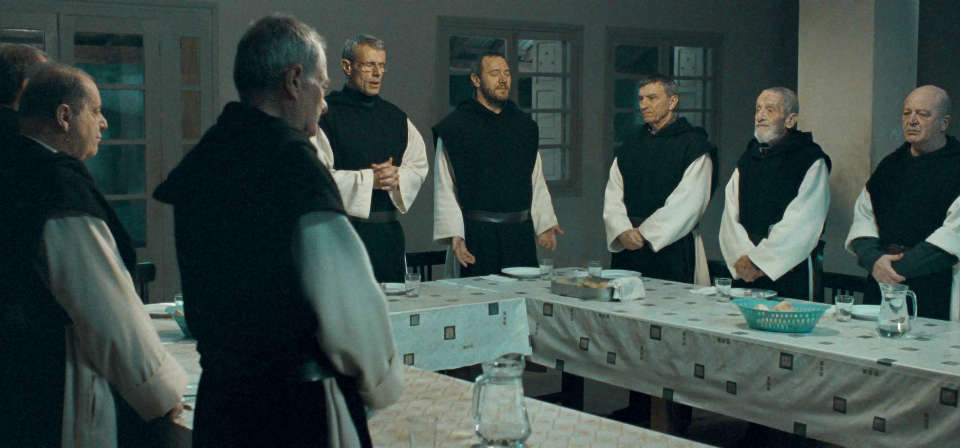Of Gods and Men (2010)
Xavier Beauvois’ sublime Of Gods and Men is that almost unheard-of film that you do not judge — it judges you. To one degree or another it defies every attempt to put it in a box, to reduce its challenge to a political or pious ideological stance to be affirmed or critiqued.
Caveat Spectator
Brief graphic violence, a few disturbing images and references; a single obscene expression. Subtitles.Whoever you are, whatever you bring to it, it will not tell you exactly what you want to hear, unless that is all you are willing or able to hear. Seldom have I read so many reviews justly genuflecting to a film amid such inability to explain why, or with such unconvincing rationalizations for critical discomfort.
The film is based on the true story of nine French Trappist monks of the Monastery of Our Lady of Atlas near the village of Tibhirine in Algeria’s Atlas Mountains, about 60 miles from Algiers, most of whom were beheaded in a 1996 incident during the Algerian Civil War. In late March the monks were taken hostage by the Armed Islamic Group (GIA), which demanded the release of prisoners held by the French government. Two months later the GIA claimed responsibility for the monks’ deaths, although the circumstances remain unclear.
Of Gods and Men is not about how the monks died, but how they lived and why they were willing to die. It tells the story of nine imperfect men who made a difficult choice to stay in a war-torn foreign country that countless citizens would gladly have fled if they could. Caught between a corrupt military government and violent extremist Muslim groups, the brothers’ choices are defined by two other relationships. One is their relationship with the Muslim villagers of Tibhirine, who regard the monks as their friends and benefactors. The other relationship is the crucial one, with an unseen Beloved.
Filmed in Morocco in French and Arabic, the film brings an almost documentary quality to how the Trappists live, pray and work, recalling Into Great Silence and the more recent No Greater Love. But here the pealing of monastery bells alternates with the adhan (the Muslim call to prayer). This is not sinister or threatening to the monks, who are truly part of the local community. The villagers invite them to family celebrations, such as a boy’s khtana (circumcision) party, and they attend. On the desk of Dom Christian (Lambert Wilson), the abbot, a copy of the Quran sits next to the Fioretti of St. Francis. Brother Luc (Michael Lonsdale, Munich) runs a free medical clinic for the villagers and all who need his services — even wounded insurgents. In a touching scene, Luc offers avuncular advice to a teenaged Muslim girl curious about falling in love, and mentions his own youthful loves — and the love to which he finally gave his heart.
The first gathering clouds are reports of violence against both Muslims and Christians. A teenaged girl in the port city of Mostaganem has been murdered in broad daylight for not wearing the hijab. Imams are being killed for speaking out against the violence. Then tragedy strikes the local community, and a number of Croatian Catholics — friends and coworkers of the Muslim villagers — are butchered on the job. “They say they’re religious,” a villager frets, meaning the insurgents. “They’ve never read the Quran.”
This is a convenient thought, but not a true one. The insurgents do know the Quran, as we learn on Christmas Day when a GIA band led by one Ali Fayattia (Farid Larbi) break into the monastery demanding to see “the Pope,” meaning Christian. That confrontation is one of the film’s most riveting and astonishing scenes, and puts to an excruciating test the Gospel ideal of not resisting evil, particularly in the absolute form of the evangelical counsels. Christian insists that the monks are called to be brothers to all, but can a Christian extend a hand of fellowship to a terrorist? Government officials accuse Christian of being “overindulgent” to the terrorists, as if the monks had weapons and prisons, and stare incredulously when the abbot prays over one of their corpses, as if there were no treason worse than praying for one’s enemies.
The film’s heart is the brothers’ soul-searching debate about whether to stay or to go — a remarkably nuanced debate that raises questions about the nature of community, authority, mission and sacrifice. At first it’s unclear whether anything is at stake other than an abstract sense of commitment, but relationships and obligations are more complex than that. From the outset neither point of view is uncompromised: Christian is stubborn and unyielding, and jumps the gun with a peremptory decision that is, the others object, contrary to the spirit of community. But some are too eager to minimize the obstacles to departing. Everyone agrees that they aren’t called to pursue martyrdom or collective suicide, but danger of death, both abstract and concrete, elicits varying levels of fearfulness and courage.
It’s remarkable how well we get to know the individual monks, from young Christophe (Olivier Rabourdin), racked with doubts, to frail, elderly Amédée (Jacques Herlin), with his beatific simplicity. As the rest argue their points of view, Amédée opens his mouth, hesitates, and closes it again, eloquent in his silence. Pressed for his opinion after the others have spoken, he gives the best answer of all: “I don’t know yet. We need to think, and pray together.” The dialogue and acting are utterly naturalistic; the film never strikes a false note. One of my favorite moments involves a four-letter word thrown out in a moment of anger by one of the monks. What I love is the gentle response of the recipient of the attack.
Of Gods and Men is a remarkably uncompromising film: uncompromising in its depiction of the challenge of Christianity, of the sharp divisions within Islam between the peaceful villagers and the bloodthirsty insurgents. It is profoundly engaged in political realities, yet it transcends politics. It is thoughtful, yet many of its best scenes are dialogue-free, from the routines of manual labor to the luminous emotional climax.
It is luminously beautiful, suffused by beauty natural and manmade, sacred and secular, moral and spiritual. Veteran cinematographer Caroline Champetier takes in the grandeur of the landscape and the seemingly haphazard architecture of the village in lingering takes and tracking shots. Christian climbs a lightly wooded hill amid a flock of sheep, a good shepherd with sheep beyond his own flock. A gunman lying supine with his feet in the foreground visually echoes Mantegna’s Lamentation Over the Dead Christ, challenging us to see Jesus in a terrorist. And when Luc presses his cheek to a large wall painting of Christ, the monk’s head and the Savior’s side become a single image of spiritual intimacy, a cinematic icon, a window into heaven.
Of Gods and Men is deeply theological and liturgical — I can think of no other film that combines so much chant and hymnody with so much in-depth discussion of the Incarnation and the meaning of vocation and martyrdom — yet its theology and liturgy is utterly practical and relevant to the real-world crises outside the monastery walls. (The title ties into an opening epigram from Psalm 82: “"I have said, Ye are gods; and all of you are children of the most High. But ye shall die like men, and fall like one of the princes.”) It is meticulously authentic. The actors spent two months learning the music and at least a week on retreat at the Tamié Abbey in France learning to live and behave as monks. The writings of the actual monks of Tibhirine informed the production, and the film’s consultants included Henry Quinson, who lived for six years at a Cistercian monastery in France and knew two of the monks in the film.
More than once, the Tibhirine monks speak to us in their own words. There is Luc’s letter to a friend, in which he quotes Pascal’s Pensées (“Men never do evil so completely and cheerfully as when they do it from religious conviction”) and expresses his resolve to continue his duties to the end. Above all, there is Christian’s spiritual testament, in which he reflects frankly and magnificently on the possibility of his murder. I could dissent theologically from a word or two here, but before the depth and integrity of the martyred author’s Christian spirit, from his acknowledgement of his own complicity to his embracing even the unknown “friend of the last minute who knew not what you were doing” and looking hopefully for their reunion as “happy thieves in paradise,” I can only place my hand over my mouth.
Available 7/5 in a two-disc Blu-ray/DVD combo pack, Of Gods and Men comes with only two extras (other than the theatrical trailer). “The Sacrificed Tibéhirine: Further Investigation” offers personal insights from the monks’ family members and touches on open questions around the circumstances of the killings. There’s also an interview with John W. Kiser, whose book The Monks of Tibhirine heavily influenced the film.
Both featurettes flesh out the story with insights into the monks, their milieu and their commitment to the people of Algeria. Kiser highlights the vow of “stability” that is part of the Trappist ethos, which the Tibhirine monks saw as binding them to their Muslim neighbors. A key incident decades earlier in the life of Christian, the abbot, is highlighted: Before entering religious life, as a policeman in Algeria, Christian’s life was saved from radicals by a Muslim policeman named Muhamad who intervened on Christian’s behalf — only to have his own throat cut the next day.
Related

Can Muslims and Christians coexist? Of Gods and Men
Of Gods and Men is the most extraordinary cinematic depiction of the Christian ideal in at least the last quarter century. It also depicts something of the variety of expressions in the Islamic world.

How Catholic is Of Gods and Men?
Has any dramatic feature film ever more powerfully communicated the beauty and attractiveness of lived Christian faith, and of the Christian faith itself, than Xavier Beauvois’s Of Gods and Men?
RE: Of Gods and Men
Link to this itemI was the monastic advisor on Of Gods and Men, and your piece is probably the best I’ve read so far. If you want to know more about the making of the movie, you should read my book (in French or Italian) Secret des hommes, secret des dieux (Presses de la Renaissance), in which I try and explain how the Holy Spirit worked throughout the whole process of this incredible movie.
The monks of Tibhirine were my friends and still are. Xavier Beauvois and his team came to meet them, and I can even witness to the fact that snow fell and melted for the final shot against all odds.
You seem to imply that only “nonbelievers” worked on this movie, but I am a devout Christian and I was there right from the beginning to the very end. I just wanted you to know because God can make himself known without our contribution, but usually He asks us to give a hand. I was blessed to be chosen here in an amazing fashion, as I explain in my book. Everything from A to Z seemed to come from Him. God bless you!
Henry Quinson, Marseilles, France
Recent
- Benoit Blanc goes to church: Mysteries and faith in Wake Up Dead Man
- Are there too many Jesus movies?
- Antidote to the digital revolution: Carlo Acutis: Roadmap to Reality
- “Not I, But God”: Interview with Carlo Acutis: Roadmap to Reality director Tim Moriarty
- Gunn’s Superman is silly and sincere, and that’s good. It could be smarter.
Home Video
Copyright © 2000– Steven D. Greydanus. All rights reserved.